University Case Study: Emily's Mental Health Assessment and Care Plan
VerifiedAdded on 2023/06/04
|7
|2034
|476
Case Study
AI Summary
This case study analyzes Emily, a 19-year-old female presenting to the emergency department with suicidal ideation and symptoms of depression and anxiety. The assignment details a comprehensive nursing care plan, addressing the client's self-destructive behaviors, drug overdose, and dietary concerns. It emphasizes the use of the clinical reasoning cycle and nursing process, incorporating evidence-based interventions such as counseling, family therapy, and medication management. The analysis considers case complexities, including the client's family dynamics and the ethical considerations surrounding her care. The plan also highlights the importance of patient-centered care, the involvement of the client's boyfriend and family, and the application of Registered Nurse Standards of Practice to ensure effective and holistic treatment within a 6-month timeframe.
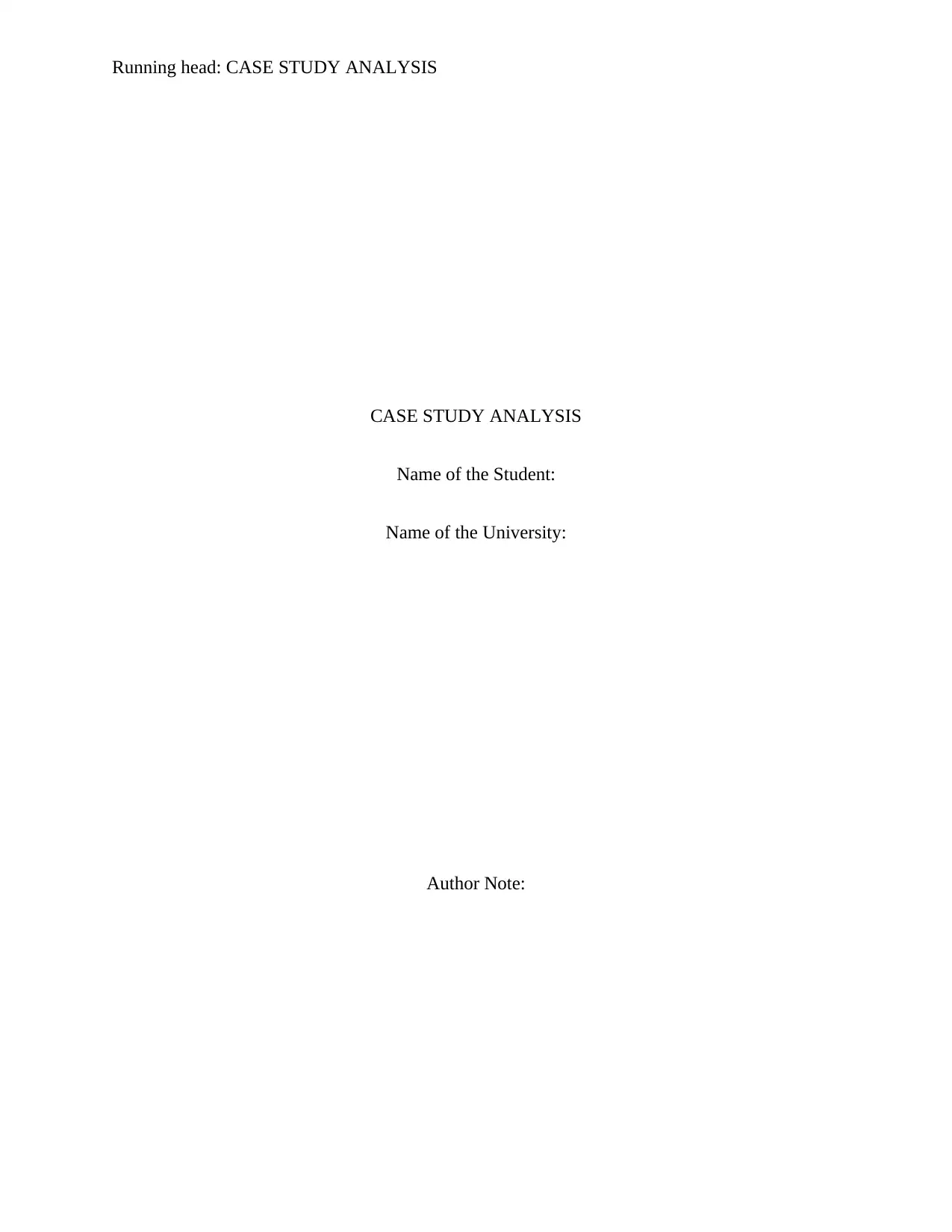
Running head: CASE STUDY ANALYSIS
CASE STUDY ANALYSIS
Name of the Student:
Name of the University:
Author Note:
CASE STUDY ANALYSIS
Name of the Student:
Name of the University:
Author Note:
Paraphrase This Document
Need a fresh take? Get an instant paraphrase of this document with our AI Paraphraser
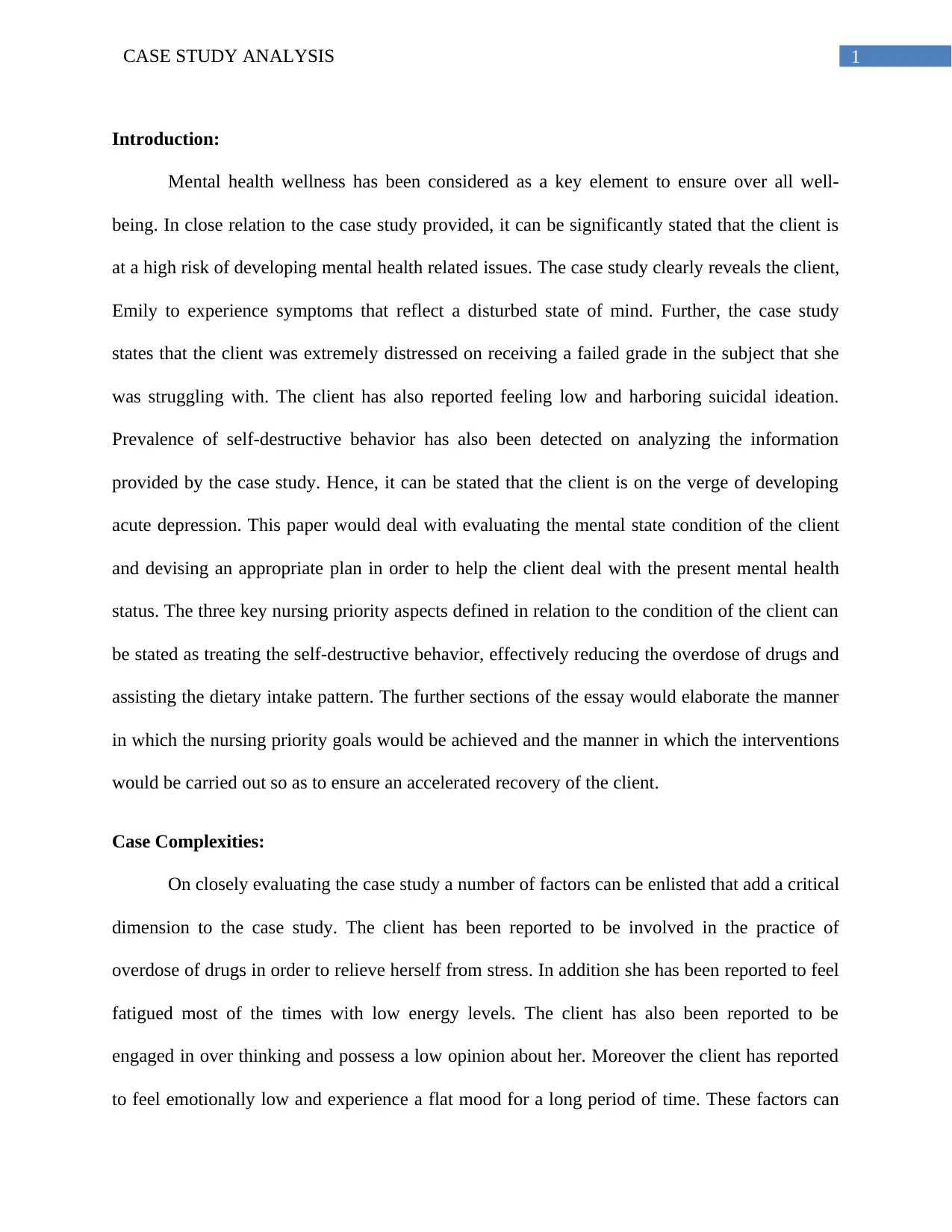
1CASE STUDY ANALYSIS
Introduction:
Mental health wellness has been considered as a key element to ensure over all well-
being. In close relation to the case study provided, it can be significantly stated that the client is
at a high risk of developing mental health related issues. The case study clearly reveals the client,
Emily to experience symptoms that reflect a disturbed state of mind. Further, the case study
states that the client was extremely distressed on receiving a failed grade in the subject that she
was struggling with. The client has also reported feeling low and harboring suicidal ideation.
Prevalence of self-destructive behavior has also been detected on analyzing the information
provided by the case study. Hence, it can be stated that the client is on the verge of developing
acute depression. This paper would deal with evaluating the mental state condition of the client
and devising an appropriate plan in order to help the client deal with the present mental health
status. The three key nursing priority aspects defined in relation to the condition of the client can
be stated as treating the self-destructive behavior, effectively reducing the overdose of drugs and
assisting the dietary intake pattern. The further sections of the essay would elaborate the manner
in which the nursing priority goals would be achieved and the manner in which the interventions
would be carried out so as to ensure an accelerated recovery of the client.
Case Complexities:
On closely evaluating the case study a number of factors can be enlisted that add a critical
dimension to the case study. The client has been reported to be involved in the practice of
overdose of drugs in order to relieve herself from stress. In addition she has been reported to feel
fatigued most of the times with low energy levels. The client has also been reported to be
engaged in over thinking and possess a low opinion about her. Moreover the client has reported
to feel emotionally low and experience a flat mood for a long period of time. These factors can
Introduction:
Mental health wellness has been considered as a key element to ensure over all well-
being. In close relation to the case study provided, it can be significantly stated that the client is
at a high risk of developing mental health related issues. The case study clearly reveals the client,
Emily to experience symptoms that reflect a disturbed state of mind. Further, the case study
states that the client was extremely distressed on receiving a failed grade in the subject that she
was struggling with. The client has also reported feeling low and harboring suicidal ideation.
Prevalence of self-destructive behavior has also been detected on analyzing the information
provided by the case study. Hence, it can be stated that the client is on the verge of developing
acute depression. This paper would deal with evaluating the mental state condition of the client
and devising an appropriate plan in order to help the client deal with the present mental health
status. The three key nursing priority aspects defined in relation to the condition of the client can
be stated as treating the self-destructive behavior, effectively reducing the overdose of drugs and
assisting the dietary intake pattern. The further sections of the essay would elaborate the manner
in which the nursing priority goals would be achieved and the manner in which the interventions
would be carried out so as to ensure an accelerated recovery of the client.
Case Complexities:
On closely evaluating the case study a number of factors can be enlisted that add a critical
dimension to the case study. The client has been reported to be involved in the practice of
overdose of drugs in order to relieve herself from stress. In addition she has been reported to feel
fatigued most of the times with low energy levels. The client has also been reported to be
engaged in over thinking and possess a low opinion about her. Moreover the client has reported
to feel emotionally low and experience a flat mood for a long period of time. These factors can
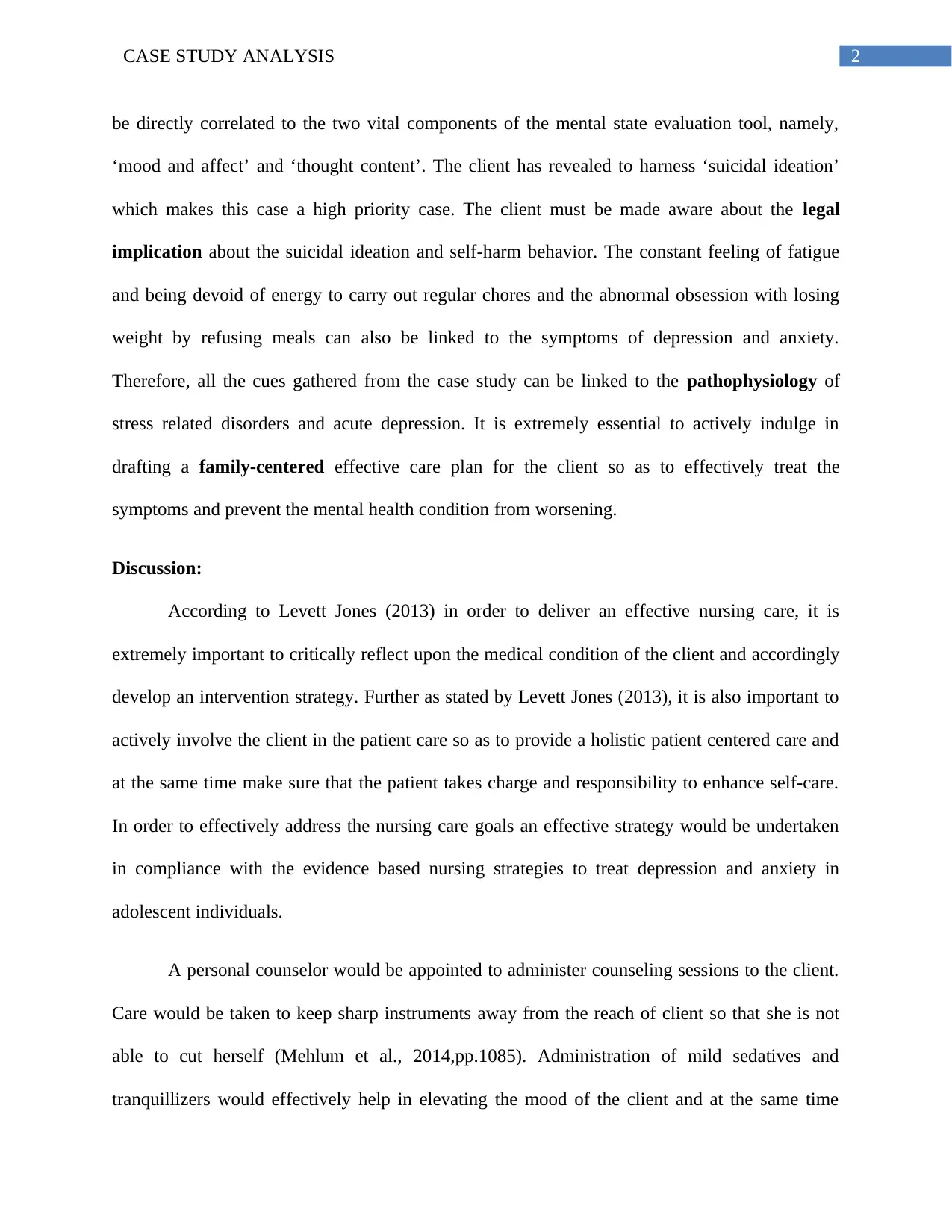
2CASE STUDY ANALYSIS
be directly correlated to the two vital components of the mental state evaluation tool, namely,
‘mood and affect’ and ‘thought content’. The client has revealed to harness ‘suicidal ideation’
which makes this case a high priority case. The client must be made aware about the legal
implication about the suicidal ideation and self-harm behavior. The constant feeling of fatigue
and being devoid of energy to carry out regular chores and the abnormal obsession with losing
weight by refusing meals can also be linked to the symptoms of depression and anxiety.
Therefore, all the cues gathered from the case study can be linked to the pathophysiology of
stress related disorders and acute depression. It is extremely essential to actively indulge in
drafting a family-centered effective care plan for the client so as to effectively treat the
symptoms and prevent the mental health condition from worsening.
Discussion:
According to Levett Jones (2013) in order to deliver an effective nursing care, it is
extremely important to critically reflect upon the medical condition of the client and accordingly
develop an intervention strategy. Further as stated by Levett Jones (2013), it is also important to
actively involve the client in the patient care so as to provide a holistic patient centered care and
at the same time make sure that the patient takes charge and responsibility to enhance self-care.
In order to effectively address the nursing care goals an effective strategy would be undertaken
in compliance with the evidence based nursing strategies to treat depression and anxiety in
adolescent individuals.
A personal counselor would be appointed to administer counseling sessions to the client.
Care would be taken to keep sharp instruments away from the reach of client so that she is not
able to cut herself (Mehlum et al., 2014,pp.1085). Administration of mild sedatives and
tranquillizers would effectively help in elevating the mood of the client and at the same time
be directly correlated to the two vital components of the mental state evaluation tool, namely,
‘mood and affect’ and ‘thought content’. The client has revealed to harness ‘suicidal ideation’
which makes this case a high priority case. The client must be made aware about the legal
implication about the suicidal ideation and self-harm behavior. The constant feeling of fatigue
and being devoid of energy to carry out regular chores and the abnormal obsession with losing
weight by refusing meals can also be linked to the symptoms of depression and anxiety.
Therefore, all the cues gathered from the case study can be linked to the pathophysiology of
stress related disorders and acute depression. It is extremely essential to actively indulge in
drafting a family-centered effective care plan for the client so as to effectively treat the
symptoms and prevent the mental health condition from worsening.
Discussion:
According to Levett Jones (2013) in order to deliver an effective nursing care, it is
extremely important to critically reflect upon the medical condition of the client and accordingly
develop an intervention strategy. Further as stated by Levett Jones (2013), it is also important to
actively involve the client in the patient care so as to provide a holistic patient centered care and
at the same time make sure that the patient takes charge and responsibility to enhance self-care.
In order to effectively address the nursing care goals an effective strategy would be undertaken
in compliance with the evidence based nursing strategies to treat depression and anxiety in
adolescent individuals.
A personal counselor would be appointed to administer counseling sessions to the client.
Care would be taken to keep sharp instruments away from the reach of client so that she is not
able to cut herself (Mehlum et al., 2014,pp.1085). Administration of mild sedatives and
tranquillizers would effectively help in elevating the mood of the client and at the same time
⊘ This is a preview!⊘
Do you want full access?
Subscribe today to unlock all pages.

Trusted by 1+ million students worldwide
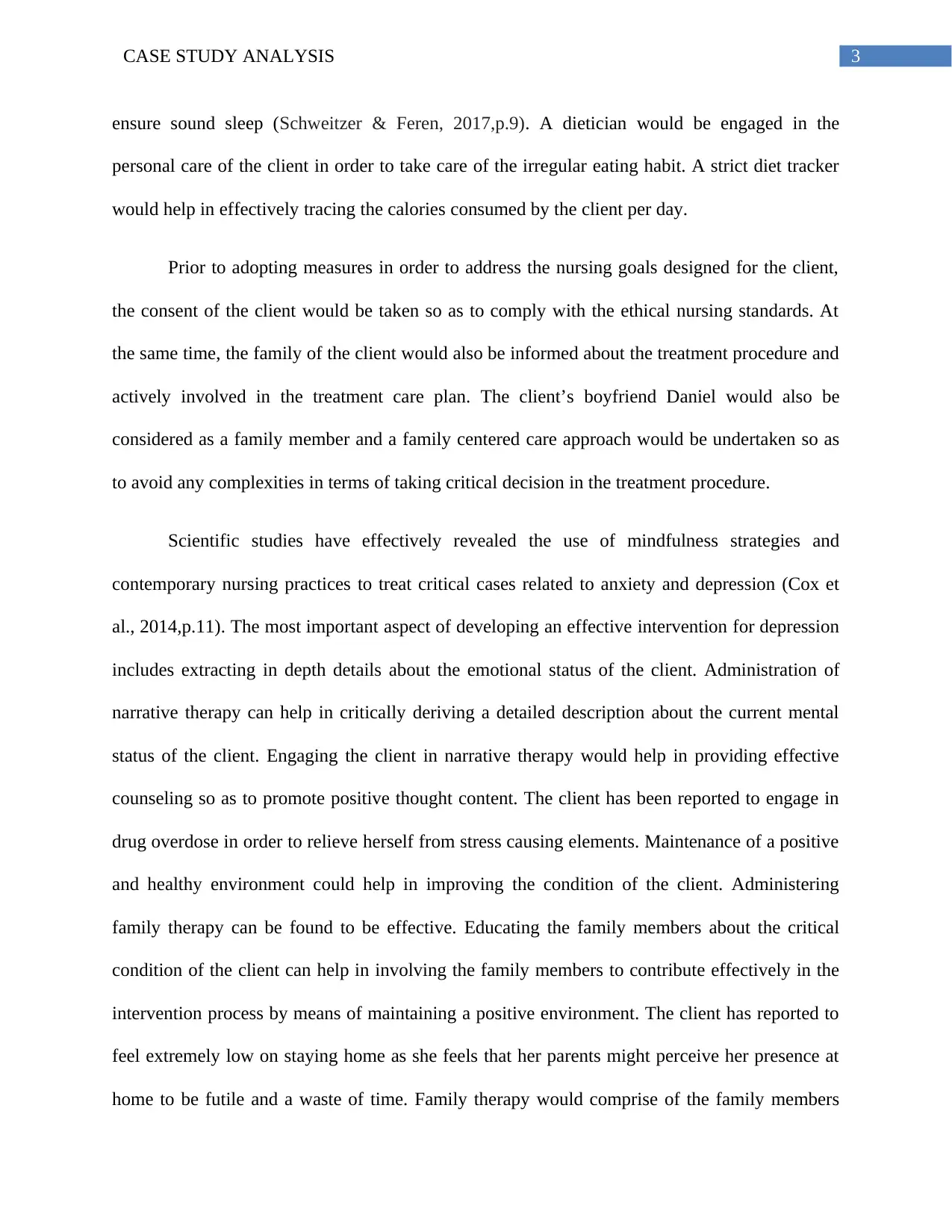
3CASE STUDY ANALYSIS
ensure sound sleep (Schweitzer & Feren, 2017,p.9). A dietician would be engaged in the
personal care of the client in order to take care of the irregular eating habit. A strict diet tracker
would help in effectively tracing the calories consumed by the client per day.
Prior to adopting measures in order to address the nursing goals designed for the client,
the consent of the client would be taken so as to comply with the ethical nursing standards. At
the same time, the family of the client would also be informed about the treatment procedure and
actively involved in the treatment care plan. The client’s boyfriend Daniel would also be
considered as a family member and a family centered care approach would be undertaken so as
to avoid any complexities in terms of taking critical decision in the treatment procedure.
Scientific studies have effectively revealed the use of mindfulness strategies and
contemporary nursing practices to treat critical cases related to anxiety and depression (Cox et
al., 2014,p.11). The most important aspect of developing an effective intervention for depression
includes extracting in depth details about the emotional status of the client. Administration of
narrative therapy can help in critically deriving a detailed description about the current mental
status of the client. Engaging the client in narrative therapy would help in providing effective
counseling so as to promote positive thought content. The client has been reported to engage in
drug overdose in order to relieve herself from stress causing elements. Maintenance of a positive
and healthy environment could help in improving the condition of the client. Administering
family therapy can be found to be effective. Educating the family members about the critical
condition of the client can help in involving the family members to contribute effectively in the
intervention process by means of maintaining a positive environment. The client has reported to
feel extremely low on staying home as she feels that her parents might perceive her presence at
home to be futile and a waste of time. Family therapy would comprise of the family members
ensure sound sleep (Schweitzer & Feren, 2017,p.9). A dietician would be engaged in the
personal care of the client in order to take care of the irregular eating habit. A strict diet tracker
would help in effectively tracing the calories consumed by the client per day.
Prior to adopting measures in order to address the nursing goals designed for the client,
the consent of the client would be taken so as to comply with the ethical nursing standards. At
the same time, the family of the client would also be informed about the treatment procedure and
actively involved in the treatment care plan. The client’s boyfriend Daniel would also be
considered as a family member and a family centered care approach would be undertaken so as
to avoid any complexities in terms of taking critical decision in the treatment procedure.
Scientific studies have effectively revealed the use of mindfulness strategies and
contemporary nursing practices to treat critical cases related to anxiety and depression (Cox et
al., 2014,p.11). The most important aspect of developing an effective intervention for depression
includes extracting in depth details about the emotional status of the client. Administration of
narrative therapy can help in critically deriving a detailed description about the current mental
status of the client. Engaging the client in narrative therapy would help in providing effective
counseling so as to promote positive thought content. The client has been reported to engage in
drug overdose in order to relieve herself from stress causing elements. Maintenance of a positive
and healthy environment could help in improving the condition of the client. Administering
family therapy can be found to be effective. Educating the family members about the critical
condition of the client can help in involving the family members to contribute effectively in the
intervention process by means of maintaining a positive environment. The client has reported to
feel extremely low on staying home as she feels that her parents might perceive her presence at
home to be futile and a waste of time. Family therapy would comprise of the family members
Paraphrase This Document
Need a fresh take? Get an instant paraphrase of this document with our AI Paraphraser
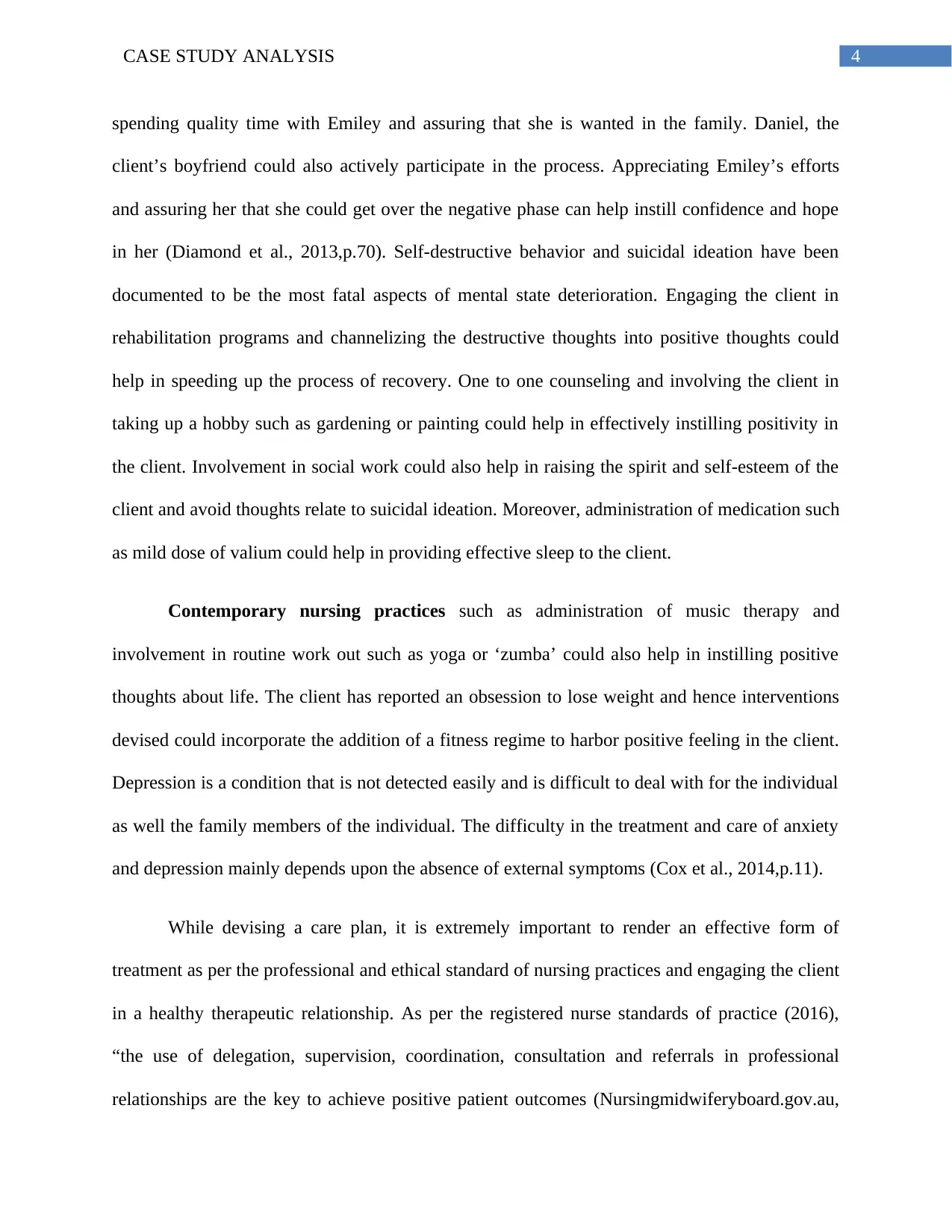
4CASE STUDY ANALYSIS
spending quality time with Emiley and assuring that she is wanted in the family. Daniel, the
client’s boyfriend could also actively participate in the process. Appreciating Emiley’s efforts
and assuring her that she could get over the negative phase can help instill confidence and hope
in her (Diamond et al., 2013,p.70). Self-destructive behavior and suicidal ideation have been
documented to be the most fatal aspects of mental state deterioration. Engaging the client in
rehabilitation programs and channelizing the destructive thoughts into positive thoughts could
help in speeding up the process of recovery. One to one counseling and involving the client in
taking up a hobby such as gardening or painting could help in effectively instilling positivity in
the client. Involvement in social work could also help in raising the spirit and self-esteem of the
client and avoid thoughts relate to suicidal ideation. Moreover, administration of medication such
as mild dose of valium could help in providing effective sleep to the client.
Contemporary nursing practices such as administration of music therapy and
involvement in routine work out such as yoga or ‘zumba’ could also help in instilling positive
thoughts about life. The client has reported an obsession to lose weight and hence interventions
devised could incorporate the addition of a fitness regime to harbor positive feeling in the client.
Depression is a condition that is not detected easily and is difficult to deal with for the individual
as well the family members of the individual. The difficulty in the treatment and care of anxiety
and depression mainly depends upon the absence of external symptoms (Cox et al., 2014,p.11).
While devising a care plan, it is extremely important to render an effective form of
treatment as per the professional and ethical standard of nursing practices and engaging the client
in a healthy therapeutic relationship. As per the registered nurse standards of practice (2016),
“the use of delegation, supervision, coordination, consultation and referrals in professional
relationships are the key to achieve positive patient outcomes (Nursingmidwiferyboard.gov.au,
spending quality time with Emiley and assuring that she is wanted in the family. Daniel, the
client’s boyfriend could also actively participate in the process. Appreciating Emiley’s efforts
and assuring her that she could get over the negative phase can help instill confidence and hope
in her (Diamond et al., 2013,p.70). Self-destructive behavior and suicidal ideation have been
documented to be the most fatal aspects of mental state deterioration. Engaging the client in
rehabilitation programs and channelizing the destructive thoughts into positive thoughts could
help in speeding up the process of recovery. One to one counseling and involving the client in
taking up a hobby such as gardening or painting could help in effectively instilling positivity in
the client. Involvement in social work could also help in raising the spirit and self-esteem of the
client and avoid thoughts relate to suicidal ideation. Moreover, administration of medication such
as mild dose of valium could help in providing effective sleep to the client.
Contemporary nursing practices such as administration of music therapy and
involvement in routine work out such as yoga or ‘zumba’ could also help in instilling positive
thoughts about life. The client has reported an obsession to lose weight and hence interventions
devised could incorporate the addition of a fitness regime to harbor positive feeling in the client.
Depression is a condition that is not detected easily and is difficult to deal with for the individual
as well the family members of the individual. The difficulty in the treatment and care of anxiety
and depression mainly depends upon the absence of external symptoms (Cox et al., 2014,p.11).
While devising a care plan, it is extremely important to render an effective form of
treatment as per the professional and ethical standard of nursing practices and engaging the client
in a healthy therapeutic relationship. As per the registered nurse standards of practice (2016),
“the use of delegation, supervision, coordination, consultation and referrals in professional
relationships are the key to achieve positive patient outcomes (Nursingmidwiferyboard.gov.au,
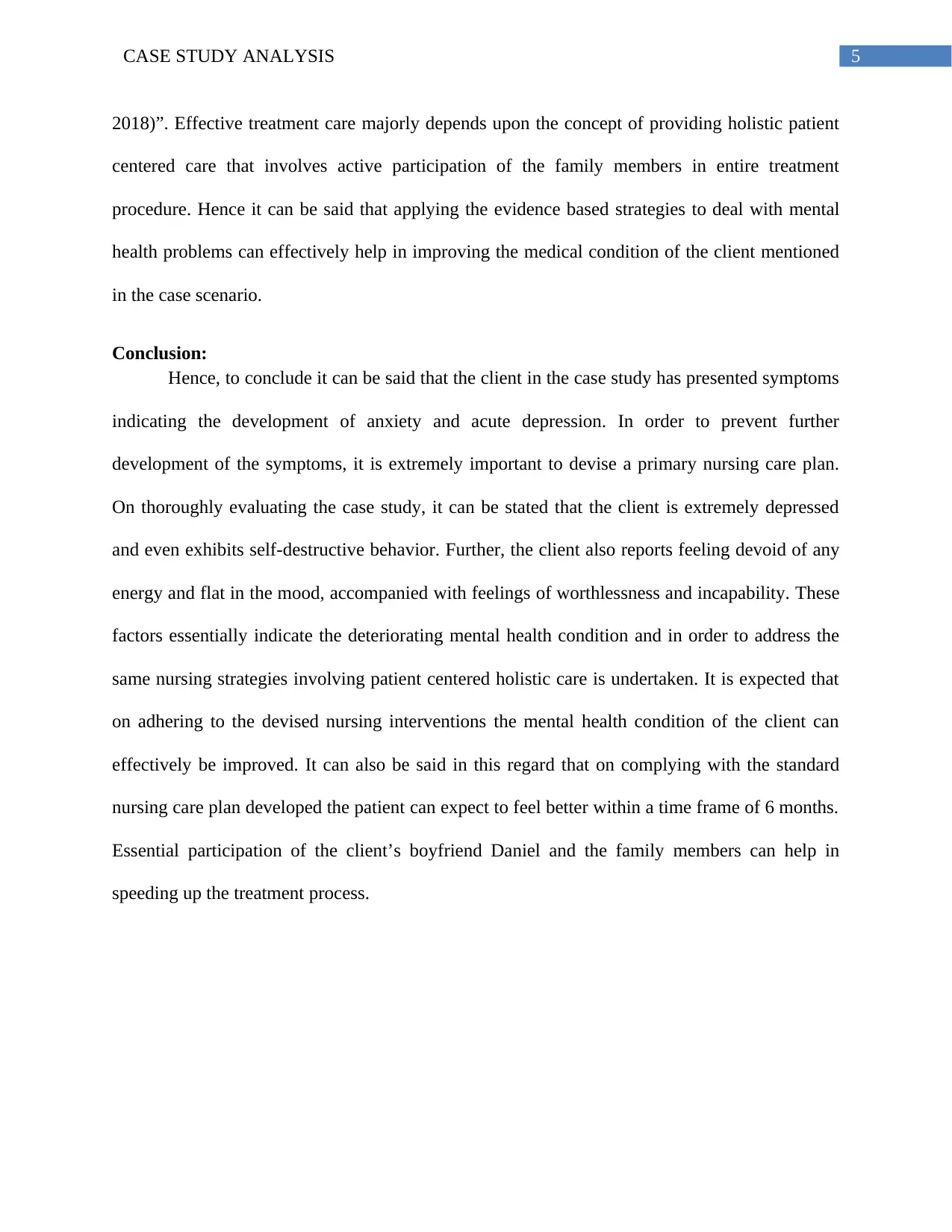
5CASE STUDY ANALYSIS
2018)”. Effective treatment care majorly depends upon the concept of providing holistic patient
centered care that involves active participation of the family members in entire treatment
procedure. Hence it can be said that applying the evidence based strategies to deal with mental
health problems can effectively help in improving the medical condition of the client mentioned
in the case scenario.
Conclusion:
Hence, to conclude it can be said that the client in the case study has presented symptoms
indicating the development of anxiety and acute depression. In order to prevent further
development of the symptoms, it is extremely important to devise a primary nursing care plan.
On thoroughly evaluating the case study, it can be stated that the client is extremely depressed
and even exhibits self-destructive behavior. Further, the client also reports feeling devoid of any
energy and flat in the mood, accompanied with feelings of worthlessness and incapability. These
factors essentially indicate the deteriorating mental health condition and in order to address the
same nursing strategies involving patient centered holistic care is undertaken. It is expected that
on adhering to the devised nursing interventions the mental health condition of the client can
effectively be improved. It can also be said in this regard that on complying with the standard
nursing care plan developed the patient can expect to feel better within a time frame of 6 months.
Essential participation of the client’s boyfriend Daniel and the family members can help in
speeding up the treatment process.
2018)”. Effective treatment care majorly depends upon the concept of providing holistic patient
centered care that involves active participation of the family members in entire treatment
procedure. Hence it can be said that applying the evidence based strategies to deal with mental
health problems can effectively help in improving the medical condition of the client mentioned
in the case scenario.
Conclusion:
Hence, to conclude it can be said that the client in the case study has presented symptoms
indicating the development of anxiety and acute depression. In order to prevent further
development of the symptoms, it is extremely important to devise a primary nursing care plan.
On thoroughly evaluating the case study, it can be stated that the client is extremely depressed
and even exhibits self-destructive behavior. Further, the client also reports feeling devoid of any
energy and flat in the mood, accompanied with feelings of worthlessness and incapability. These
factors essentially indicate the deteriorating mental health condition and in order to address the
same nursing strategies involving patient centered holistic care is undertaken. It is expected that
on adhering to the devised nursing interventions the mental health condition of the client can
effectively be improved. It can also be said in this regard that on complying with the standard
nursing care plan developed the patient can expect to feel better within a time frame of 6 months.
Essential participation of the client’s boyfriend Daniel and the family members can help in
speeding up the treatment process.
⊘ This is a preview!⊘
Do you want full access?
Subscribe today to unlock all pages.

Trusted by 1+ million students worldwide
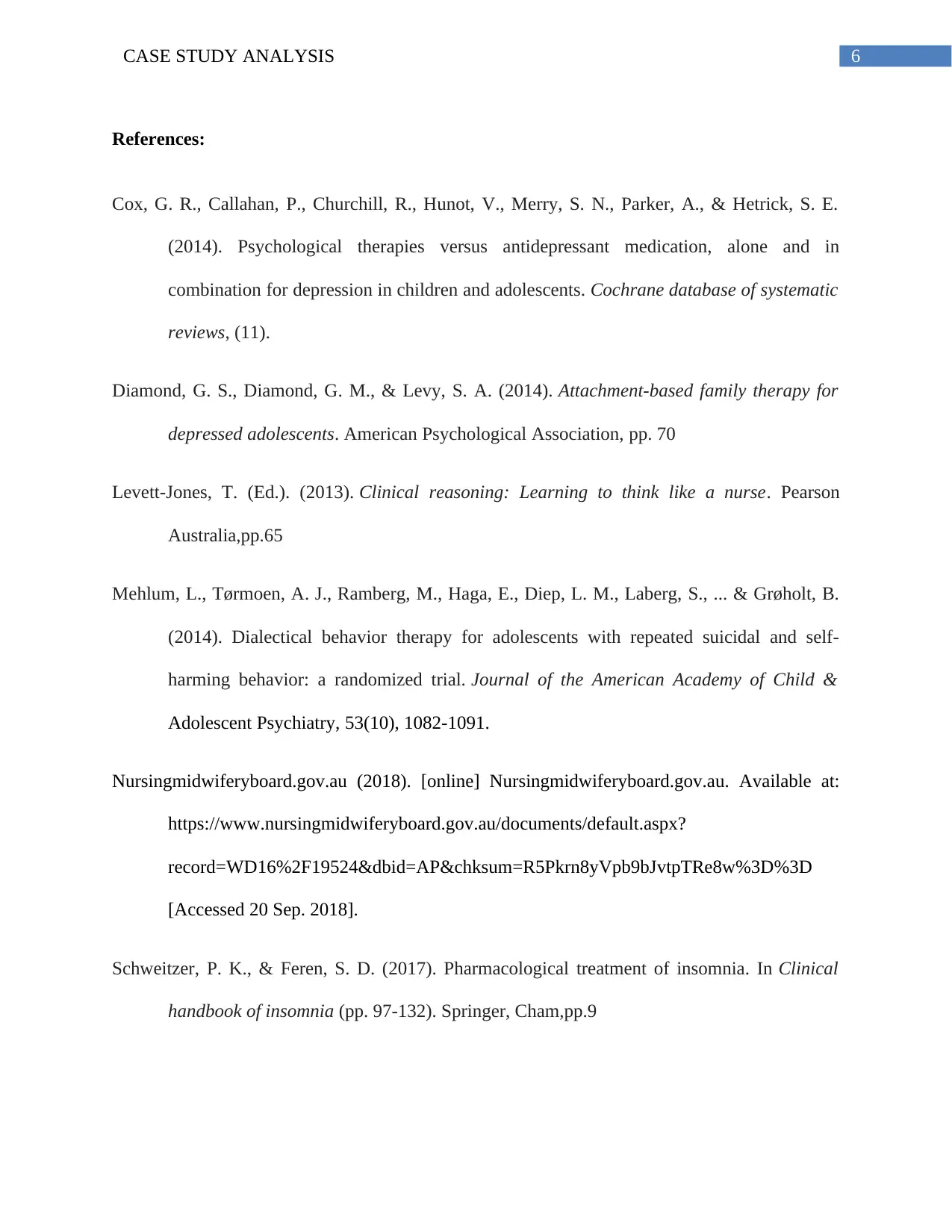
6CASE STUDY ANALYSIS
References:
Cox, G. R., Callahan, P., Churchill, R., Hunot, V., Merry, S. N., Parker, A., & Hetrick, S. E.
(2014). Psychological therapies versus antidepressant medication, alone and in
combination for depression in children and adolescents. Cochrane database of systematic
reviews, (11).
Diamond, G. S., Diamond, G. M., & Levy, S. A. (2014). Attachment-based family therapy for
depressed adolescents. American Psychological Association, pp. 70
Levett-Jones, T. (Ed.). (2013). Clinical reasoning: Learning to think like a nurse. Pearson
Australia,pp.65
Mehlum, L., Tørmoen, A. J., Ramberg, M., Haga, E., Diep, L. M., Laberg, S., ... & Grøholt, B.
(2014). Dialectical behavior therapy for adolescents with repeated suicidal and self-
harming behavior: a randomized trial. Journal of the American Academy of Child &
Adolescent Psychiatry, 53(10), 1082-1091.
Nursingmidwiferyboard.gov.au (2018). [online] Nursingmidwiferyboard.gov.au. Available at:
https://www.nursingmidwiferyboard.gov.au/documents/default.aspx?
record=WD16%2F19524&dbid=AP&chksum=R5Pkrn8yVpb9bJvtpTRe8w%3D%3D
[Accessed 20 Sep. 2018].
Schweitzer, P. K., & Feren, S. D. (2017). Pharmacological treatment of insomnia. In Clinical
handbook of insomnia (pp. 97-132). Springer, Cham,pp.9
References:
Cox, G. R., Callahan, P., Churchill, R., Hunot, V., Merry, S. N., Parker, A., & Hetrick, S. E.
(2014). Psychological therapies versus antidepressant medication, alone and in
combination for depression in children and adolescents. Cochrane database of systematic
reviews, (11).
Diamond, G. S., Diamond, G. M., & Levy, S. A. (2014). Attachment-based family therapy for
depressed adolescents. American Psychological Association, pp. 70
Levett-Jones, T. (Ed.). (2013). Clinical reasoning: Learning to think like a nurse. Pearson
Australia,pp.65
Mehlum, L., Tørmoen, A. J., Ramberg, M., Haga, E., Diep, L. M., Laberg, S., ... & Grøholt, B.
(2014). Dialectical behavior therapy for adolescents with repeated suicidal and self-
harming behavior: a randomized trial. Journal of the American Academy of Child &
Adolescent Psychiatry, 53(10), 1082-1091.
Nursingmidwiferyboard.gov.au (2018). [online] Nursingmidwiferyboard.gov.au. Available at:
https://www.nursingmidwiferyboard.gov.au/documents/default.aspx?
record=WD16%2F19524&dbid=AP&chksum=R5Pkrn8yVpb9bJvtpTRe8w%3D%3D
[Accessed 20 Sep. 2018].
Schweitzer, P. K., & Feren, S. D. (2017). Pharmacological treatment of insomnia. In Clinical
handbook of insomnia (pp. 97-132). Springer, Cham,pp.9
1 out of 7
Related Documents
Your All-in-One AI-Powered Toolkit for Academic Success.
+13062052269
info@desklib.com
Available 24*7 on WhatsApp / Email
![[object Object]](/_next/static/media/star-bottom.7253800d.svg)
Unlock your academic potential
Copyright © 2020–2026 A2Z Services. All Rights Reserved. Developed and managed by ZUCOL.



